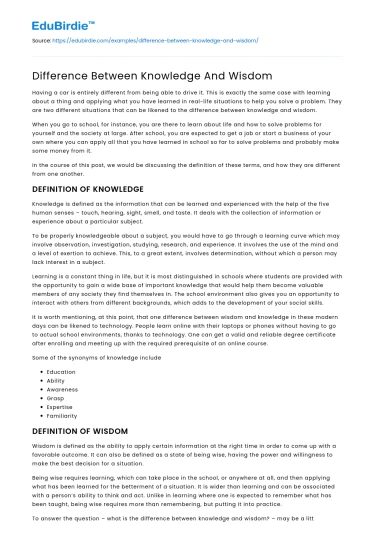Having a car is entirely different from being able to drive it. This is exactly the same case with learning about a thing and applying what you have learned in real-life situations to help you solve a problem. They are two different situations that can be likened to the difference between knowledge and wisdom.
When you go to school, for instance, you are there to learn about life and how to solve problems for yourself and the society at large. After school, you are expected to get a job or start a business of your own where you can apply all that you have learned in school so far to solve problems and probably make some money from it.
Save your time!
We can take care of your essay
- Proper editing and formatting
- Free revision, title page, and bibliography
- Flexible prices and money-back guarantee
In the course of this post, we would be discussing the definition of these terms, and how they are different from one another.
DEFINITION OF KNOWLEDGE
Knowledge is defined as the information that can be learned and experienced with the help of the five human senses – touch, hearing, sight, smell, and taste. It deals with the collection of information or experience about a particular subject.
To be properly knowledgeable about a subject, you would have to go through a learning curve which may involve observation, investigation, studying, research, and experience. It involves the use of the mind and a level of exertion to achieve. This, to a great extent, involves determination, without which a person may lack interest in a subject.
Learning is a constant thing in life, but it is most distinguished in schools where students are provided with the opportunity to gain a wide base of important knowledge that would help them become valuable members of any society they find themselves in. The school environment also gives you an opportunity to interact with others from different backgrounds, which adds to the development of your social skills.
It is worth mentioning, at this point, that one difference between wisdom and knowledge in these modern days can be likened to technology. People learn online with their laptops or phones without having to go to actual school environments, thanks to technology. One can get a valid and reliable degree certificate after enrolling and meeting up with the required prerequisite of an online course.
Some of the synonyms of knowledge include
- Education
- Ability
- Awareness
- Grasp
- Expertise
- Familiarity
DEFINITION OF WISDOM
Wisdom is defined as the ability to apply certain information at the right time in order to come up with a favorable outcome. It can also be defined as a state of being wise, having the power and willingness to make the best decision for a situation.
Being wise requires learning, which can take place in the school, or anywhere at all, and then applying what has been learned for the betterment of a situation. It is wider than learning and can be associated with a person’s ability to think and act. Unlike in learning where one is expected to remember what has been taught, being wise requires more than remembering, but putting it into practice.
To answer the question – what is the difference between knowledge and wisdom? – may be a little tricky since they have similar meanings. But taking a look at their synonyms would help to clear things up a bit. Some of the synonyms of wisdom are as follows.
- Prudence
- Caution
- Foresight
- Experience
- Judgment
MAIN DIFFERENCES BETWEEN KNOWLEDGE VS WISDOM
Perspective is another factor that comes to play when comparing these terms. This is why both terms are regarded as synonyms. Putting knowledge vs wisdom side by side in a tabular form will easily show how these terms are different from each other, as well as how they may be similar.
BASIS OF COMPARISON KNOWLEDGE WISDOM
Definition The information that can be learned and experienced with the help of the five human senses – touch, hearing, sight, smell, and taste The ability to apply certain information at the right time in order to come up with a favorable outcome
- Identified as Gaining organized information Applying information
- Results to Comprehension Judgment
- Nature Selective Comprehensive
- Approach Theoretical Spiritual
CONCLUSION
The question – what is the difference between wisdom and knowledge? – should not be much of a problem to you at this point, if at all. The saying goes – knowledge is power – but with all that we have disclosed in the course of this piece, it is obvious that there would be no power if knowledge is not applied.






 Stuck on your essay?
Stuck on your essay?

